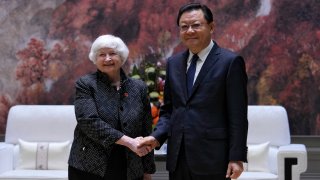
U.S. Treasury Secretary Janet Yellen called on China on Friday to address manufacturing overcapacity that she said could cause global economic dislocation and to create a level-playing field for American companies and workers.
Starting a five-day visit to China in one of the country’s major industrial and export hubs, she said she would raise industrial overcapacity and what the U.S. considers to be unfair Chinese trade practices during what will likely be tough talks with senior China officials.
“There are a broad swath of economic interactions” between the U.S. and China “that should remain uncontroversial,” she said at an event hosted by the American Chamber of Commerce in China in Guangzhou. But, she said, there are “Chinese practices tilting the playing field away” from U.S. firms.
Yellen, the first Cabinet-level official to visit China since President Joe Biden met Chinese leader Xi Jinping last November, has telegraphed that she will raise what the U.S. considers to be unfair Chinese trade practices, a concern shared by many European countries.
Get Tri-state area news and weather forecasts to your inbox. Sign up for NBC New York newsletters.
"This includes the issue of China’s industrial overcapacity, which the United States and other countries are concerned can cause global spillovers,” she said.
After meeting the governor, Yellen spoke with U.S. business leaders at the American Chamber event and took questions from them in an auditorium of a marbled convention center in the Baiyun District of Guangzhou.
“I’ve heard from many American business executives that operating in China can be challenging,” Yellen said at an event hosted by the American Chamber of Commerce in China on Friday afternoon.
U.S. & World
Citing a recent survey by the Chamber that found that a third of American firms in China say they have experienced unfair treatment compared to local competitors, Yellen says the U.S. has seen China “pursue unfair economic practices, including imposing barriers to access for foreign firms and taking coercive actions against American companies.”
“I strongly believe that this doesn’t only hurt these American firms: ending these unfair practices would benefit China by improving the business climate here. I intend to raise these issues in meetings this week,” she says in her speech.
Earlier in the day, she also met with American, European and Japanese business representatives to hear their concerns.
Guangzhou is the capital of Guangdong province, a Chinese manufacturing and export hub that is home to telecom giant Huawei and BYD, China’s largest EV maker. Huawei has been hit hard by U.S. restrictions on semiconductor exports to China and is at the vanguard of Chinese efforts to become self-sufficient and a leader in technology.
Government subsidies and other policy support have encouraged solar panel and EV makers in China to invest in factories, building far more production capacity than the domestic market can absorb.
The massive scale of production has driven down costs and ignited price wars for green technologies, a boon for consumers and efforts to reduce global dependence on fossil fuels. But Western governments fear that that capacity will flood their markets with low-priced exports, threatening American and European jobs.
Yellen will head to Beijing next.
Eswar Prasad, a trade professor at Cornell University, expects Yellen to push Beijing to bolster domestic consumption and ensure fair competition in new technology sectors, especially green energy and electric vehicles, along with adequate market access for U.S. companies.
"Concerns about China attempting to export its overcapacity and simultaneously making a big push into these sectors will be top of mind for the U.S. delegation,” he said.
China has pushed back against the overcapacity concerns expressed by both the U.S. and Europe.
Foreign Ministry spokesperson Wang Wenbin said earlier this week that the growth in Chinese EV and solar exports is conducive to green development globally and the result of the international division of labor and market demand.
He accused the U.S. of interfering with free trade by restricting technology exports to China.
“As for who is doing non-market manipulation, the fact is for everyone to see,” he said. “The U.S. has not stopped taking measures to contain China’s trade and technology. This is not ‘de-risking,’ rather, it is creating risks.”
Yellen said at the American Chamber event that “excess capacity is a concern that many countries share — from a range of advanced and developing countries and is not something that's new."
“This is not anti-China policy,” she said. “It’s an effort for us to mitigate the risks from the inevitable global economic dislocation that will result if China doesn’t adjust its policies.”
Scott Paul, president of the Alliance for American Manufacturing — an alliance of businesses and the U.S. Steelworkers union — told The Associated Press ahead of Yellen’s trip that “there is a limited amount of expectations we should have about the Chinese government and how it responds; one thing that Yellen hopefully can and should say is that the U.S. is prepared to use all the tools that we have available through policy to ensure that China’s industrial overcapacity doesn’t negatively harm our economic and national security interests.”
The Alliance released a report in February that says the introduction of inexpensive Chinese autos to the American market “could end up being an extinction-level event for the U.S. auto sector.” The U.S. auto sector accounts for 3% of America’s GDP, according to the report.
Yellen told reporters Wednesday during an Alaska refueling stop en route to Asia that the U.S. “won’t rule out” tariffs to respond to China’s heavily subsidized manufacturing of green energy products.
___
Moritsugu contributed from Beijing.



